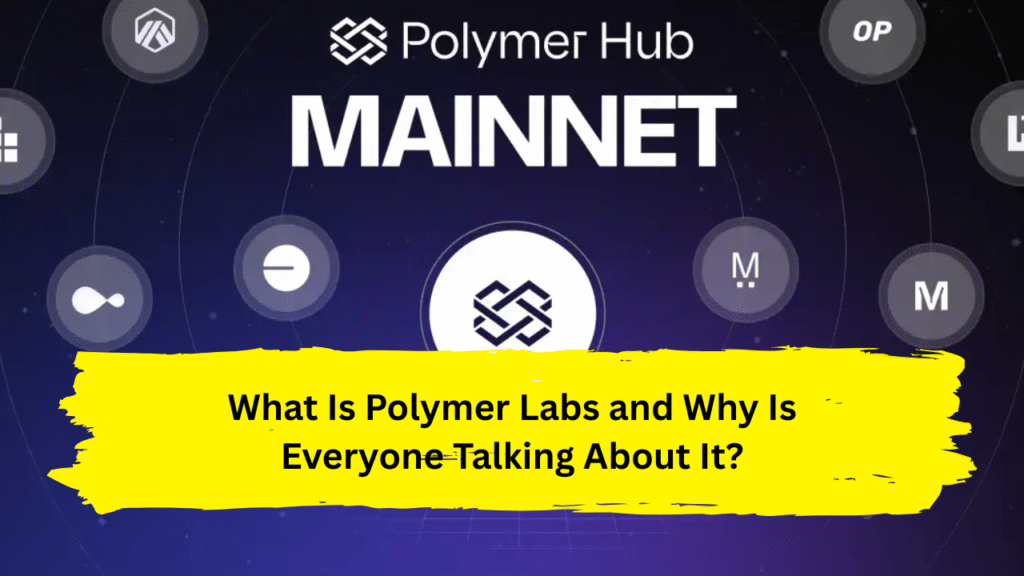If you’ve been on Twitter (or X) recently and spotted “Polymer Labs” trending, you’re not alone. This blockchain startup has caught the attention of crypto enthusiasts, developers, and VCs alike. But what exactly is Polymer Labs? And why are people saying it could be the “glue” of the modular blockchain world?
In this post, we’re breaking it all down for you—from what Polymer Labs does, to why it’s suddenly blowing up, and what it means for the future of Web3.
Understanding Polymer Labs
A Quick Intro to Polymer Labs
Polymer Labs is a cutting-edge blockchain infrastructure company focused on interoperability. In simple terms, it’s helping blockchains “talk” to each other. Imagine trying to send a text from an iPhone to an Android back in 2005—it didn’t always work. That’s how blockchains are today. Polymer Labs is building the solution.
Founders and Origins
Polymer Labs was founded by a group of crypto veterans and engineers passionate about scalability and cross-chain communication. While the team stays relatively low-key, they’re backed by major VCs and contributors from Cosmos, Ethereum, and Polkadot ecosystems.
Mission and Vision Behind the Project
Their mission? To unlock a modular, composable future for Web3 by connecting blockchains seamlessly—starting with Ethereum. They believe blockchains shouldn’t be siloed, and dApps shouldn’t be stuck in walled gardens.
What Does Polymer Labs Do?
Layer Zero? Layer One? Polymer Is Layer Two and Beyond
We’ve heard of Layer 1s like Ethereum and Solana, and Layer 2s like Arbitrum and Optimism. Polymer Labs positions itself as a Layer 2+ interoperability infrastructure, enabling communication between all layers using standardized protocols.
Building Interoperability for the Modular Blockchain Future
Instead of building new chains, Polymer is enhancing the infrastructure that lets different chains work together. Think of it as a universal translator for blockchains. It uses IBC (Inter-Blockchain Communication) to enable secure, standardized messaging between chains.
Connecting Chains Using IBC (Inter-Blockchain Communication)
IBC was originally built by Cosmos, but Polymer Labs is bringing it to Ethereum. This means Ethereum-based dApps could soon interact natively with other ecosystems like Avalanche, Near, or even Bitcoin sidechains.
Polymer and IBC – Why It Matters
What Is IBC and Why Should You Care?
IBC (Inter-Blockchain Communication) is a protocol that lets independent blockchains transfer messages and data securely. It’s like TCP/IP for crypto networks. With IBC, tokens, governance votes, NFTs—anything—can move across chains seamlessly.
How Polymer Brings IBC to Ethereum and Other Chains
Polymer Labs is building the Ethereum implementation of IBC. This means that Ethereum, which was previously “IBC-blind”, will now be able to send and receive messages from other IBC-enabled chains—a huge leap for interoperability.
The Role of Polymer in Web3 Infrastructure
Making Ethereum Modular
Ethereum is moving toward a modular architecture, separating execution, data availability, and consensus. Polymer helps glue all these components together using IBC. It supports rollups, appchains, and sidechains to work together smoothly.
A New Era for Dapps and DeFi
With Polymer Labs, DeFi apps can span multiple chains, aggregators can pull liquidity from everywhere, and dApps can be chain-agnostic. That’s like turning every blockchain into one giant super-network.
Why Is Polymer Labs Trending Right Now?
Funding Announcement and Investor Interest
Polymer Labs recently raised a significant funding round led by top VCs in the crypto space. That alone made headlines. Investors love infrastructure plays—especially ones focused on interoperability.
Recent Product Milestones or Testnet Launches
They also launched a testnet or released a major update (based on recent X trends), which got developers buzzing. The dev community is excited to test out IBC on Ethereum—something previously not possible.
Twitter Buzz and Developer Hype
Influencers and devs are talking. The buzz is real. People are saying Polymer could be the “Cosmos SDK of Ethereum”—a bold claim, but it speaks volumes.
Is Polymer Labs the “Next Big Thing” in Blockchain?
Unique Value Proposition Compared to Other Projects
Unlike most L2s that just scale Ethereum, Polymer Labs enables cross-chain interaction. It’s not just faster or cheaper—it’s smarter and more connected.
How It Competes with Celestia, Cosmos, and Optimism
Polymer complements projects like Celestia (data availability), Cosmos (IBC originator), and Optimism (Ethereum L2). It’s not directly competing, but instead building the pipes between them.
Analyst and Community Sentiment
The sentiment is bullish. Developers see Polymer as foundational. Analysts love the IBC narrative. And communities are rallying behind open standards like IBC over proprietary bridges.
Potential Use Cases of Polymer Labs’ Technology
Interconnected DEXs and Cross-Chain Swaps
Imagine swapping tokens between Ethereum and Avalanche with zero friction. Polymer makes that a reality.
Governance and DAO Coordination Across Chains
DAOs could coordinate votes across chains. That’s next-level decentralization.
Developer Tooling and Modular SDKs
Developers can build once and deploy across many chains without worrying about custom bridges or hacks. Polymer’s SDKs make this accessible.
How to Get Involved with Polymer Labs
Join the Community
Check out their Discord or follow them on Twitter to stay in the loop.
Participate in Testnets and Developer Programs
Polymer runs public testnets. You can try deploying cross-chain apps and earn early user rewards.
Follow Their Roadmap and GitHub
Developers should star their GitHub and keep an eye on roadmap updates. There’s a lot coming in 2025.
Risks and Challenges Ahead
Technical Hurdles with Cross-Chain Scaling
Cross-chain protocols are complex. Bugs or miscommunication can lead to serious exploits.
Competition and Market Saturation
Everyone wants a piece of the interoperability pie—from LayerZero to Wormhole. Polymer needs to stand out.
Regulatory Uncertainty
As cross-chain activity increases, so does regulatory scrutiny. Polymer must navigate this carefully.
Final Thoughts – Is Polymer Labs Worth Watching?
Absolutely. Polymer Labs isn’t just another blockchain project. It’s laying the groundwork for the next evolution of Web3, where chains no longer compete—they collaborate. If you’re a developer, investor, or just a curious observer, this is one trend worth keeping on your radar.
FAQs About Polymer Labs
1. What is Polymer Labs in simple terms?
Polymer Labs is a blockchain infrastructure company focused on helping different blockchains communicate using IBC.
2. What is IBC, and how does Polymer use it?
IBC (Inter-Blockchain Communication) is like the internet for blockchains. Polymer brings IBC to Ethereum, making it interoperable with other chains.
3. Is Polymer Labs a Layer 1 or Layer 2?
It’s not a traditional Layer 1 or 2. Polymer is infrastructure that enhances interoperability across layers—think of it as a Layer 2+.
4. Why is Polymer Labs trending on Twitter?
Due to a combination of funding news, product milestones, and excitement around IBC on Ethereum.
5. How can I start using Polymer Labs technology?
You can join their testnet, explore GitHub, or follow updates on X and Discord for developer opportunities.
Also Read: Latest Trending News


